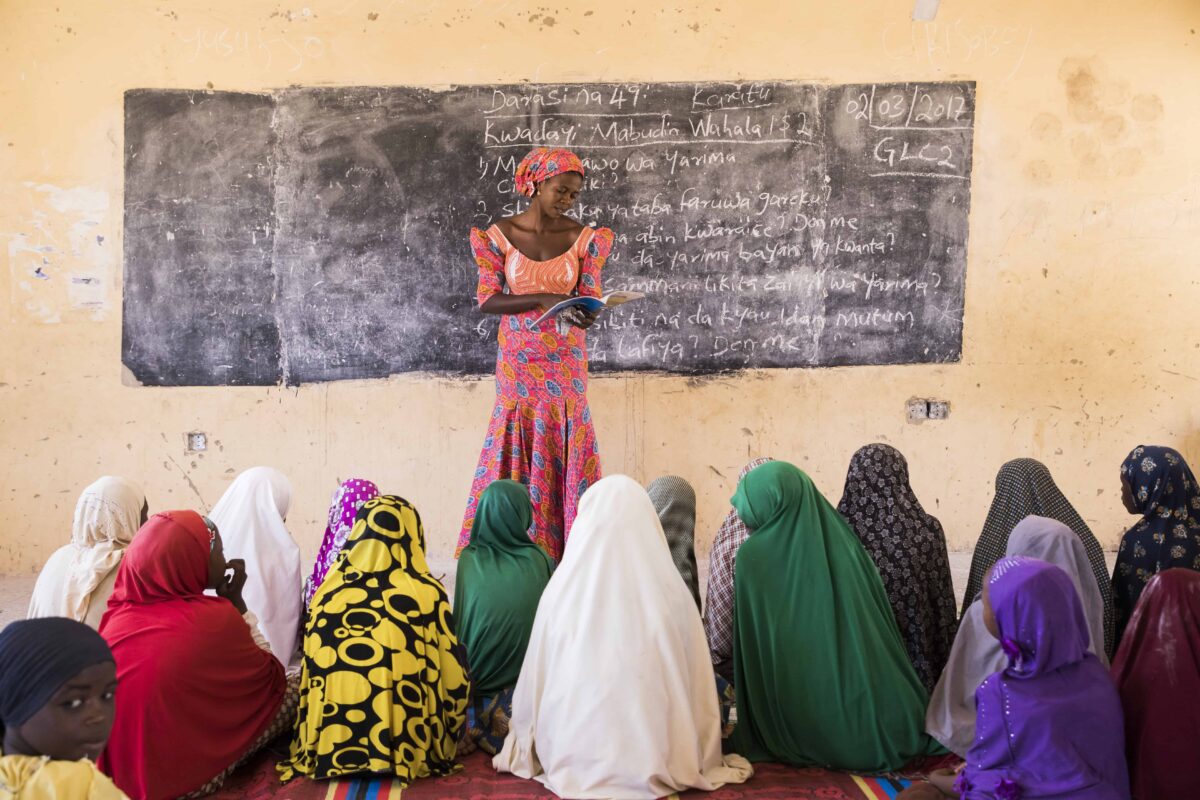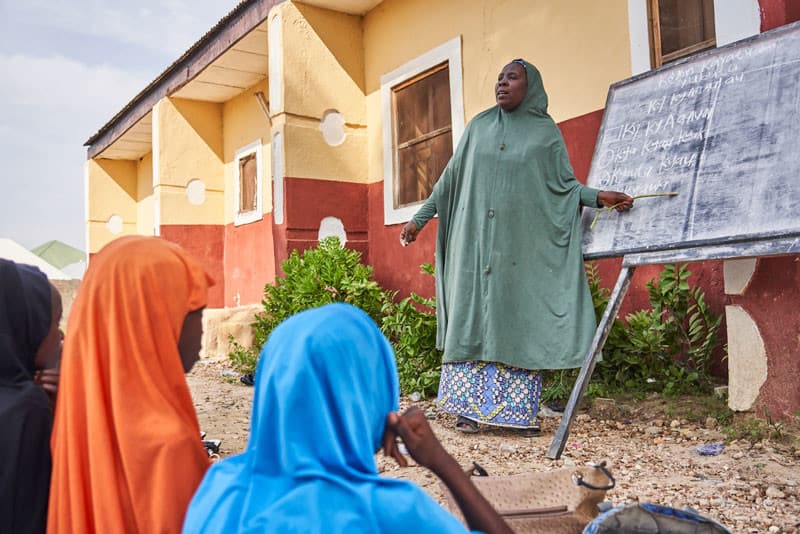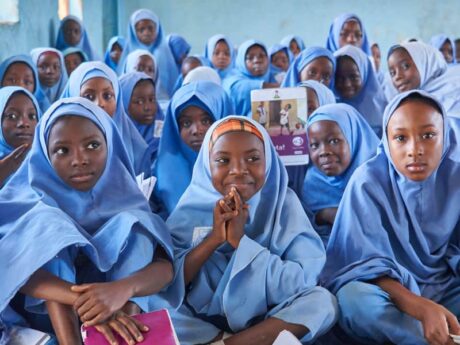More than 30 percent of school-aged children in Northern Nigeria do not have access to basic education. Attacks by the Boko Haram insurgency in the region compound the problem; more than 1 million school-aged children have been forced to flee their homes.
In crisis-affected environments like this, strengthening education systems and enrollment in secure learning environments is critical. Yet reform cannot succeed and be sustained unless all key stakeholders take clear ownership of their respective roles, said experts on a panel at the Comparative and International Education Society conference on March 7.
“A close collaborative working relationship between all of the partners—the project implementers, USAID and the state government is imperative,” said Croshelle Harris-Hussein, Director of the U.S. Agency for International Development’s Education Office in Nigeria.
Opening the panel session called “System Strengthening for Improved Reading Outcomes and Increased Access in Northern Nigeria: Perspectives and Practices from the USAID Northern Education Initiative Plus Program,” Harris-Hussein said that when thinking about system strengthening in education, certain factors should inform the design of the project—such as governance, transparency and accountability. These are necessary to reach the ultimate goal of creating safe learning spaces for all beneficiaries.
Establishing strong local and state governmental systems can result in improved service delivery for teacher training, curriculum development and delivery of instructional materials, she added.
With these best practices in mind, USAID has launched the Nigeria Education Initiative Plus project to rebuild and strengthen the education system and increase access to quality education in Nigeria’s Sokoto and Bauchi states. It is implemented by Creative Associates International.
The project is building program ownership among federal, state and local government education authorities, as well as ensuring commitment to quality early grade reading instruction and access to education.
Early assessments map challenges and guide project design
In Sokoto state, the Northern Education Initiative Plus supports 10 out of the 23 local government areas. Sokoto’s Commissioner of Basic and Secondary Education, Muhammed Jabbi Kilgori, Ph.D, partners with the project to oversee basic education in the targeted schools.
On the panel, Kilgori discussed pre-existing challenges to the education system in Sokoto and Bauchi. “We discovered weak implementation of policy, inadequate political will and lack of proper budgetary allocation and fund release for basic education,” he said.
He also noted several other systemic challenges in both states, such as no existing reading policy and a lack of teaching quality and motivation among teachers—all resulting in low student performance.
A 2011 Early Grade Reading Assessment conducted in Sokoto and Bauchi revealed that more than 80 percent of Sokoto students and 70 percent of Bauchi students assessed scored zero on the oral reading fluency subtask.
The findings from this early grade reading assessment— the first in Nigeria’s Hausa language—have helped inform and shape project priorities such as delivering basic education focused on reading skills, training and managing teachers, budgeting and ensuring school governance is sufficient.
Kilgori added that poor school facilities and a lack of community and parental participation, such as Parent Teacher Associations, are additional challenge for the education system to address.
Given the quality of education offered, Kilgori said families in poverty carefully weigh the cost of keeping their children at home to contribute to the household income versus spending hours traveling back and forth to school and sitting in a classroom all day.
“Parents see no point in bringing their child to school when the classroom isn’t operational and the children go back home knowing nothing,” said Kilgori.
To begin to address these challenges and bring quality education to Sokoto and Bauchi states, stakeholders came together as a cohesive group to establish a strategic plan of action.
“Basic education in Sokoto and Bauchi requires all hands on deck,” said Kilgori. “That means that everyone must work together to address the challenges on the ground.”
Kilgori noted progress is being made in the targeted areas and learning competencies–especially with girls–have improved through the various project interventions.
Rethinking existing basic education policies
Despite the challenges, the coalition of partners working on the Nigeria Education Initiative Plus are optimistic about what their sustained and collaborative efforts to strengthen the system can achieve.
“Education is the most viable platform to empower people,” said Muhammed Bello Yusuf, Nigeria Education Initiative Plus Reading Officer. “The partners are committed, motivated and have the political will to fix problems and to transform Nigeria’s education system.”
All of the partners meet monthly for joint planning and to review the project’s progress and tackle issues that arise. Timely measurement and monitoring of these activities, as well as regularly communicating success and challenges with all of the stakeholders, helps to address issues quickly, explained Yusuf.
Recognizing that states need support to effectively implement these sustainable and systemic education reforms, the project uses an integrated approach to strengthen the education system. The project partners with states to assess in-depth institution capacity; establish Technical Working Groups and Education Steering Committees; strengthens the policy environment; and leverage the expertise of multilevel stakeholders.
The integrated model is essential to the project’s goals, said Musa Salami, Nigeria Education Initiative Plus System Strengthening Specialist.
“To reach the project’s education objectives, bringing all of these key aspects together has been important to articulate why there is a need for education policy reform and how it contributes to state GDP gains,” he said.
Early project achievements are moving in the right direction, he noted.
The two supported states have committed over 20 percent of their annual state budgets to education. They have taken steps to improve systems for book allocation, distribution and utilization, and have enrolled more than 35,000 learners in non-formal learning centers.
This renewed state commitment, along with the support of communities, donors and other partners, is critical to improving quality basic education in the two states, said Garba Gandu, Deputy Director of the Nigerian Educational Research and Development Council.
“To be sustainable, education system strengthening in the North is everybody’s business– from the local community to government officials,” he said.



